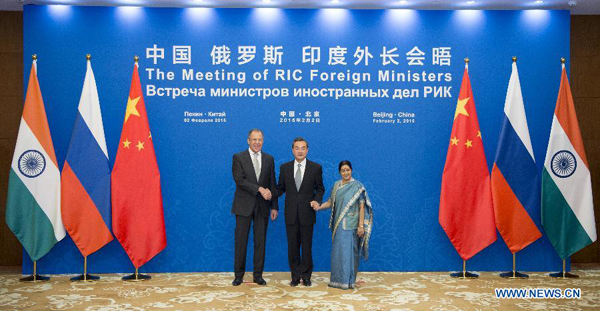Full text of joint communique of Russian, Indian, Chinese FMs' meeting
(Xinhua) Updated: 2015-02-03 10:02
5. The Ministers recognized that the year 2015 marks the 70th anniversary of the founding of the United Nations and the victory in the Second World War, and paid tribute to all those who fought against Fascism and for freedom. Russia, India and China affirmed the need to solemnly commemorate those historic moments of great significance in human history and their commitment to safeguarding a fair and equitable international order based on the purposes and principles of the UN Charter, preventing war and conflict and promoting the progress and development of mankind. The Ministers welcomed the inclusion of the item of "Seventieth anniversary of the end of the Second World War" in the agenda of the 69th session of the UN General Assembly, and supported the United Nations and member states to initiate and organize commemorative events.
6. The Ministers reiterated their strong commitment to the United Nations as a universal multilateral organization entrusted with the mandate of helping the world community maintain international peace and security, advance common development and promote and protect human rights. The United Nations enjoys universal membership and is at the very center of global governance and multilateralism. The Ministers recalled the 2005 World Summit Outcome Document. They reaffirmed the need for a comprehensive reform of the United Nations, including its Security Council, with a view to making it more representative and efficient, so that it could better respond to global challenges. Foreign Ministers of China and Russia reiterated the importance they attached to the status of India in international affairs and supported its aspiration to play a greater role in the United Nations.
7. The Ministers reiterated their commitment to strengthening coordination and cooperation in a joint effort to maintain lasting peace and stability in the Asia-Pacific region, welcomed the 4th Summit of the Conference on Interaction and Confidence Building Measures in Asia (CICA) and the Shanghai Declaration adopted at the Summit. The Ministers pledged to work together to seek common, comprehensive, cooperative and sustainable security. They called for the development of an open, inclusive, indivisible and transparent security and cooperation architecture in the region on the basis of universally recognized principles of international law. In this regard, they welcomed the continued discussion on regional security architecture in the Asia-Pacific region under the framework of the East Asia Summit.
8. The Ministers further underlined the necessity to strengthen coordination and cooperation in various regional forums and organizations such as the ASEAN Regional Forum (ARF), ASEAN Defense Ministers Meeting Plus (ADMM-Plus), Asia-Europe Meeting (ASEM) and Asia Cooperation Dialogue (ACD), so as to contribute to maintaining regional peace and stability and to promote regional development and prosperity. In this connection, they agreed to establish a trilateral Russia-India-China consultation mechanism on Asia-Pacific affairs, with the first meeting to be held at an early date.
9. Russia, India and China attached special importance to their cooperation within the Shanghai Cooperation Organization (SCO), regarding it as one of the key instruments in promoting multilateral political, security, economic and humanitarian interaction in the region. China and India shared the plans of Russia's Chairmanship in the SCO in 2014-2015 and would support and participate comprehensively in preparing the SCO Summit Meeting in Ufa in July 2015. China and Russia welcomed India's application for full membership of SCO and supported India to join the SCO after completing all necessary negotiations and legal processes.
- Indian PM Modi to visit China in May
- President Xi meets Russian FM
- Xi eyes continued correct direction for China-India ties
- China, India to boost tourism cooperation
- Obama's trip to India smells like a conspiracy to some
- Media key to China-India relations, minister says
- China, India build on relationship
- Indian Foreign Minister to visit China







